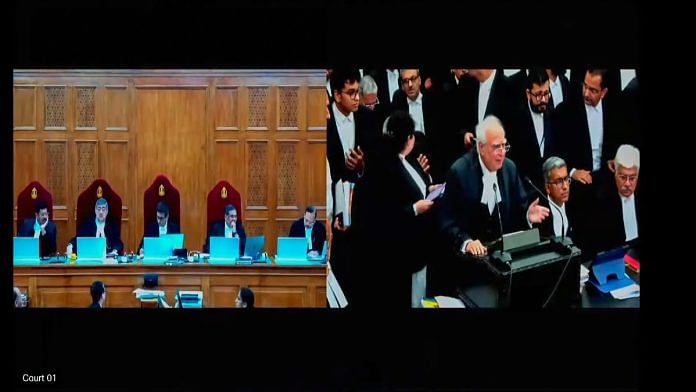New Delhi: A five-judge Constitution Bench of the Supreme Court Wednesday commenced its hearing in the Article 370 case, five years after notices were issued on the batch of petitions challenging the Article’s abrogation and subsequent division of the erstwhile state of Jammu and Kashmir into two Union territories through an Act of Parliament.
Senior advocate Kapil Sibal, appearing for National Conference leader Mohammad Akbar Lone — one of the petitioners in the case — told the bench led by Chief Justice of India (CJI) D.Y. Chandrachud that Article 370 was “tossed out of the window” through a “political act” and not a “constitutional act”.
The other judges on the bench are justices S.K. Kaul, Sanjeev Khanna, B.R. Gavai and Surya Kant.
Sibal also contended that although the headnote of Article 370 terms it a temporary provision in the Constitution, its content does not reflect this. He argued that the provision could have been abrogated only with the consent of the Constituent Assembly of J&K, which existed from 1951 to 1957.
Once the Constituent Assembly of the erstwhile state ceased to exist, it could not have been touched at all, meaning Article 370 had attained permanence, said Sibal.
However, the bench expressed apprehensions about accepting Sibal’s arguments and posed several questions regarding Article 370 and its three clauses that defined the Centre’s relationship with the erstwhile state.
Sibal will continue with his arguments Thursday.
Article 370 of the Constitution had bestowed a special status to the former state of J&K. In August 2019, through a Presidential order, the Centre scrapped the Article and subsequently introduced a bill to bifurcate it into two Union territories — one with a legislative assembly (J&K) and the other without (Ladakh).
The cessation of Article 370 followed political developments in J&K including BJP’s withdrawal from the PDP-BJP coalition and the erstwhile state falling into governor’s rule. After the end of six months of governor’s rule, the state was brought under President’s Rule on 19 December, 2018. This was extended further for another six months on 3 July, 2019.
Also Read: SC calls Manipur govt out on ‘absolute breakdown of law & order’, summons DGP
‘Never happened in India’s history’
Sibal began his submissions with a statement that J&K was and will always be part of India. He gave a brief summary of the history of its accession to India and said the instrument of accession embodied Article 370. However, unlike other provinces, J&K’s accession to India was conditional, he said.
In his arguments, Sibal touched upon the imposition of the President’s Rule to say that the apex court would have to take a final call on its validity as well. The petitioners have claimed that promulgation of President’s Rule suspended Article 3 of the Constitution, which protects the views and consent of people. With regard to J&K, it suspended the people’s right to be heard before the formation of a new state or alteration of its areas.
Delving deeper into the scheme of Article 370, Sibal argued that the said provision deals with the application of laws passed by Parliament to Jammu and Kashmir and also envisages three distinct modes of cooperation between the Union and the state (erstwhile J&K).
He said that under clause 3 of Article 370, not only would the consent of the Constituent Assembly be required, but the motion to change, amend and abrogate it must be initiated by the Constituent Assembly.
Also, Article 370 starts with a non-obstante clause, which implies that the President’s Rule cannot be used to override express requirements of consultation or concurrence or recommendation given to the specific authorities named therein, he submitted.
He further pointed out that pursuant to the Constitution of Jammu and Kashmir coming into force, the Constituent Assembly — which was dissolved on 1 January, 1957 — had performed all its functions, including defining J&K’s existing relationship with India. On the dissolution of the Constituent Assembly, there was no authority under Article 370 that could give any recommendation for the purpose of amending or abrogating it.
Sibal assailed the abrogation on the ground that it was a political decision and that the process ordained by the law — “engrafted into the Constitution” — was not followed.
“The Parliament took upon themselves the constitutional responsibility of saying we are not the legislature, we are the Constituent Assembly and we will exercise the will of the people of J&K to abrogate 370. In essence, that’s what has happened,” he told the bench.
Sibal faulted the bifurcation to say that a state cannot be divided into a UT, though a UT can be carved out of one. “This (state converting into a UT) has never happened in the history of the country,” he contended.
With the scrapping, J&K moved away from representative democracy without any constitutional basis, he argued, complaining that though the Centre held parliamentary elections in J&K, it chose not to conduct state polls that would lead to the election of representatives to the assembly.
In response to Sibal’s assertions on the permanent nature of Article 370, the bench reminded him that the Article finds its place in Part XXI of the Constitution, which relates to temporary, transitional and special provisions. The CJI said Article 370 specifically uses the expression temporary. “Can we then by saying that power under clause (3) goes once the Constituent Assembly comes to an end really convert this into a permanent provision, which never was intended to be by the Constitution,” enquired the CJI.
Sibal, however, maintained that Article 370 was a temporary provision and should be interpreted as a separate independent provision, on its own terms, even if it was part of Part XXI.
(Edited by Amrtansh Arora)
Also Read: 24,000+ cases pending in SC for more than 5 yrs, 8,000 for over a decade, govt tells Rajya Sabha



